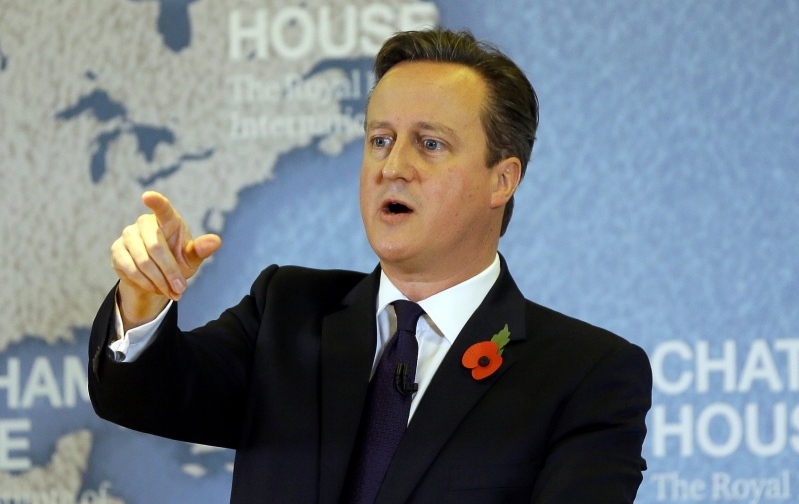
British Prime Minister David Cameron appealed to doubters at home and in other EU capitals on Tuesday to embrace his attempt to reform the 28-member bloc as a chance to boost prosperity rather than writing it off as "Mission Impossible".
Cameron, under pressure after overseeing what critics see as a lackluster start to the renegotiation of Britain's ties with the European Union, used a speech to offer the most detail yet on four areas where he wants change.
He outlined the strong economic and foreign policy role Britain plays in the EU but said he did not doubt that Britain could survive if its people voted to leave the EU in a referendum by the end of 2017.
Cameron asked for understanding from Eurosceptics at home and from European partners, some of whom have become frustrated with London's demands for change.
"There will be those who say, here and elsewhere in the EU, that we are embarked on 'Mission Impossible'," Cameron told diplomats, reporters and business leaders at the Chatham House think tank in London.
"I do not believe so for a minute ... The European Union has a record of solving intractable problems. It can solve this one too. Let us therefore resolve to do so, because the prize is a big one."
Cameron also sent a letter to Donald Tusk, president of the European Council, setting out his four main objectives to launch what he described as the renegotiation's "formal phase" before a December summit when EU leaders will hammer out the details of Britain's new terms.
Tusk said in Brussels that talks would start next week.
The renegotiation could be difficult, with the question of benefits to EU migrants likely to cause the most trouble.
The EU executive said it saw demands for new limits on the rights of EU citizens working in other member states as "highly problematic".
In his speech, Cameron spelt out what he wanted from Brussels.
He said his demands for financial and economic safeguards for countries outside the 19 member euro zone and for the EU to become more competitive must be legally binding and therefore may require treaty change.
He also called for groups of national parliaments to be able to block European laws, part of his move to make sure Britain is excluded from the principle of "ever closer union".
It will be almost impossible to complete treaty change in two years and would mean several EU states holding referendums which governments fear they would lose as European politics turn increasingly Eurosceptic.
On migration, he said he proposed that people coming to Britain from the EU must live in the country for four years before qualifying for in work benefits or social housing, and that the practice of sending child benefit overseas should stop.
The latter demand could cause the most difficulty in the renegotiation, with EU members, especially in eastern Europe from where hundreds of thousands of people have left for Britain, complaining that it would be discriminatory.
"REASONABLE APPROACH"
Cameron appealed to EU governments for understanding, saying none of his demands were "outlandish or absurd", and tried to appease Eurosceptics, including some in his Conservative Party, which has been divided over the EU for decades.
"I must be very, very clear. I don't want this reasonable approach to be misunderstood. Reasonable does not mean lacking in resolve," he said.
"I understand, of course that every negotiation must involve just that - negotiation. But Britain is the second biggest economy in the EU. We are the second biggest contributor to the EU budget. Along with France, we are its foremost military power. We gain from the Union, but we bring a lot to it."
He underlined that Britain had helped the EU form a strong response to the conflict in Syria and in launching sanctions against Russian officials over the Ukraine crisis.
But he balanced that with what Britons got from the EU, saying the country's economic security and national security was closely connected to its membership of the bloc.
"Today as we confront fresh threats and dangers to our country, I am in no doubt that for Britain, the European question is not just about economic security but national security too," he said.
The British leader used the speech to give his strongest warning yet that Britain will leave if its people vote that way and that there would be no second chances.
The French daily, Liberation, called his threats: "EU exit: Cameron's blackmail" - a feeling shared by some other European officials.
But Britain's Eurosceptics were quick to criticize the prime minister for setting his sights too low in the renegotiation.
Nigel Farage, the leader of the UK Independence Party, said Cameron was not aiming for anything "substantial".
"His speech was an attempt to portray a new 'third way' relationship with Brussels that is simply not on offer," he said in a statement.
Most Britons say they will vote to stay in the European Union, according to opinion polls so far, but the gap has narrowed between the "Yes" and "No" camps largely driven by fears over migration after thousands have arrived on EU shores.





![[Exclusive Interview] A revelation within the brink of life and death — Meg Leung’s mission in Christian art](https://www.gospelherald.com/media/cache/thumbnail/7/21/72163sp_273w_150h_1x_1y.jpg)

